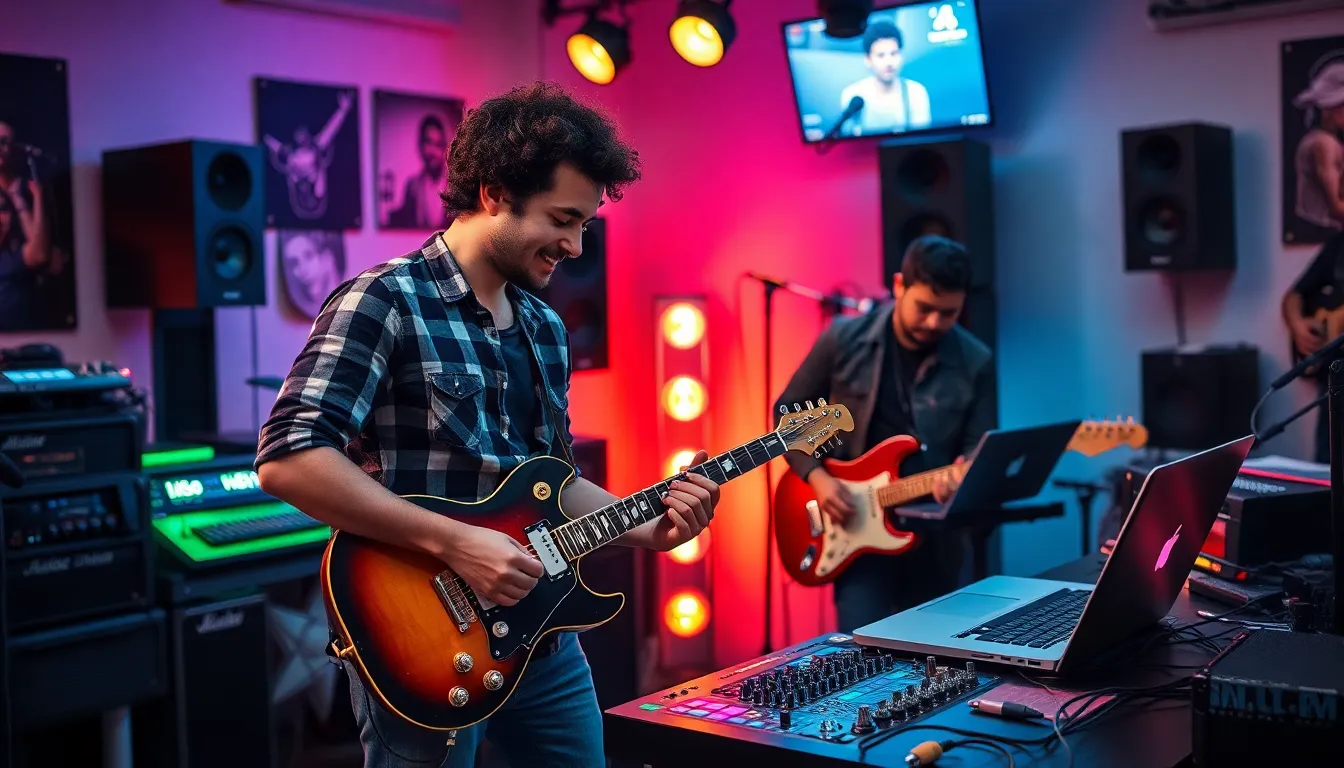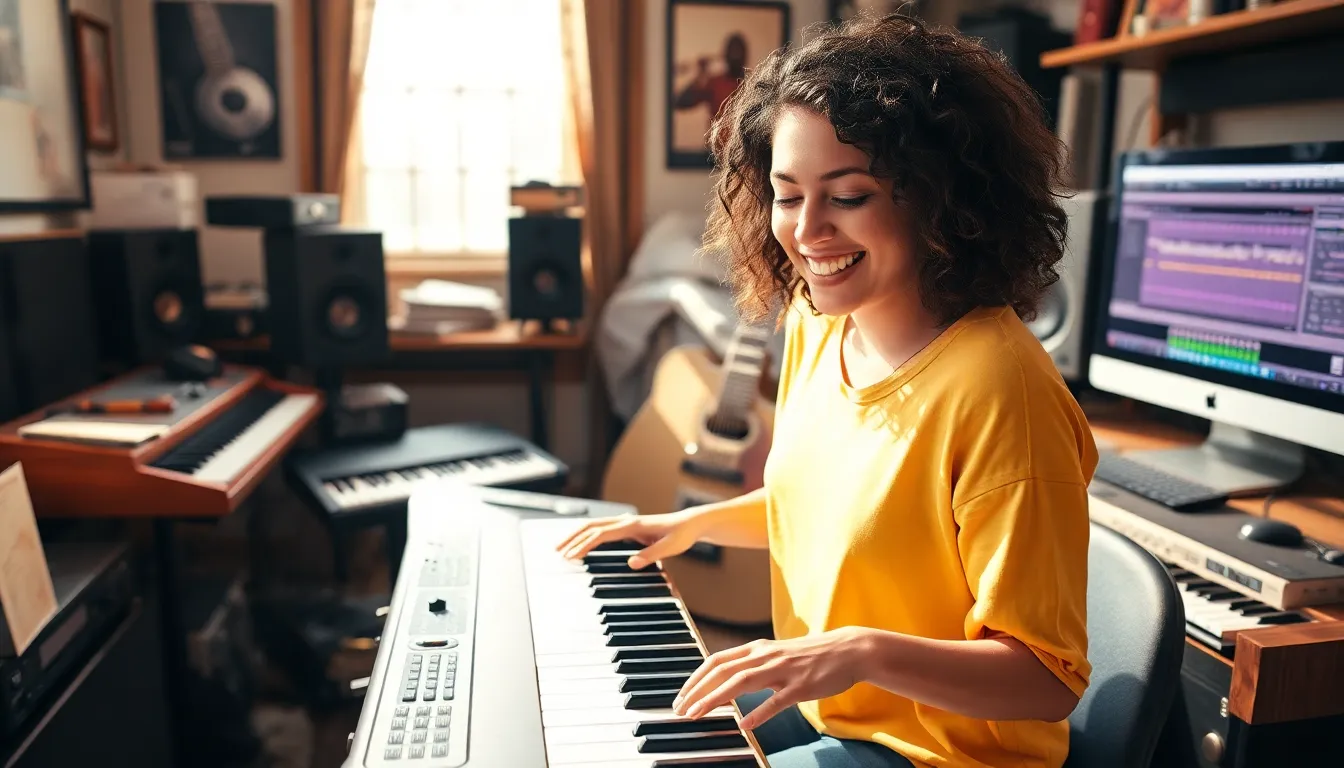Table of Contents
ToggleCreating music isn’t just for the Mozart wannabes or guitar-shredding rock stars. It’s for everyone who’s ever hummed a tune in the shower or belted out their favorite song in the car. Imagine transforming those catchy melodies stuck in your head into a full-fledged masterpiece. With the right tools and a sprinkle of creativity, anyone can dive into the exhilarating world of music-making.
Understanding How To Create Music
Creating music involves a blend of creativity and technical knowledge. Individuals possess the ability to transform simple ideas into full compositions.
The Basics of Music Creation
Understanding rhythm, melody, and harmony forms the foundation of music creation. Rhythm provides the beat, while melody serves as the tune. Harmony enriches the sound through chord progressions. Composing often begins with a simple idea, such as a catchy melody or a rhythmic pattern. Experimentation is key; trying different notes and sounds can lead to unique outcomes. A solid grasp of music theory helps in structuring these elements effectively. Recognizing how genres influence style can also enhance creativity. Ultimately, making music requires practice and exploration to develop a personal style.
Essential Tools for Music Production
Several tools can facilitate the music production process. Digital Audio Workstations, or DAWs, such as Ableton Live and Logic Pro, serve as primary platforms for recording and editing. MIDI controllers provide an intuitive way to create melodies and rhythms. Audio interfaces connect instruments and microphones to a computer. Synthesizers and samplers expand sound options, allowing for innovative compositions. Software plugins can enhance sounds with effects like reverb and compression. Using quality headphones or studio monitors improves sound fidelity during production. Investing in these essential tools significantly enhances the music creation experience.
Different Genres of Music Creation

Diverse genres of music creation offer opportunities for creativity. Each genre possesses unique characteristics that inspire individuals to experiment.
Exploring Popular Genres
Pop music emphasizes catchy melodies and relatable lyrics. Rock music features powerful guitar riffs and strong vocals. Jazz encourages improvisation, allowing musicians to express themselves freely. Electronic music utilizes technology to create innovative sounds and rhythms. Hip-hop combines rhythmic speech with beats, often focusing on storytelling. Understanding these genres helps individuals tailor their creations and connect with audiences.
Unique Approaches to Genre Creation
Innovative artists often blend multiple genres to create something fresh. Fusing elements from different styles can result in distinctive sounds. Experimentation with unconventional instruments enhances creativity. Collaborations with artists from various backgrounds introduce new perspectives. Utilizing technology, such as sampling and looping, facilitates genre bending. Exploring personal influences encourages authentic expressions in music creation. Each approach offers a foundation for musicians to develop unique identities.
Techniques to Enhance Your Music Creation
Experimenting with various techniques enhances music creation. Creating memorable songs involves specific strategies that can elevate composition skills.
Songwriting Tips and Tricks
Consider starting with a strong hook. Crafting a catchy phrase or melody captures listeners’ attention immediately. Writing lyrics that resonate emotionally strengthens the connection with the audience. Utilize imagery and storytelling to convey messages effectively. Keeping a consistent structure helps to create a flow that feels natural. Regularly revisiting and revising works allows for refinement and improvement. Solicit feedback from fellow musicians or friends to gain fresh perspectives. Lastly, setting aside specific times for writing fosters a disciplined approach to creativity.
Using Technology in Music Creation
Embrace digital audio workstations for seamless music production. Software like Ableton Live and Logic Pro offers extensive editing capabilities and sound libraries. MIDI controllers enable precise manipulation of sounds and instruments. Experimenting with audio plugins can unlock unique effects and textures. Incorporating sampling tools broadens creative possibilities, allowing for the inclusion of diverse sounds. Utilizing virtual instruments provides access to a wide range of musical options. Collaborating online with other musicians enhances innovation and introduces new ideas. Prioritizing technological tools in the music-making process can significantly elevate the overall quality of compositions.
Collaborating with Other Musicians
Collaboration enhances music creation by bringing fresh perspectives and diverse talents together. Working with other musicians often leads to innovative ideas and new sounds, enriching the creative process.
Benefits of Collaboration
Collaborating offers numerous advantages. Accessing different skills can lead to a well-rounded composition. It promotes learning, enabling musicians to explore new techniques and genres. Sharing feedback helps refine musical ideas. Engaging with others creates a sense of community, supporting motivation and accountability. Collective brainstorming sparks creativity, inspiring unique directions that individuals alone might not consider.
Finding the Right Collaborators
Identifying suitable collaborators is crucial for a successful partnership. Assess musical similarities and differences to ensure a complementary dynamic. Networking through social media, music forums, and local events aids in finding potential partners. Listening to others’ work provides insights into their style and artistic vision. Establish open communication to discuss goals and expectations, ensuring that all parties align on the creative process. Building relationships with diverse artists encourages cross-genre experimentation and leads to exciting musical outcomes.
Creating music is a fulfilling journey that invites everyone to express their unique voices. With creativity and the right tools anyone can transform simple ideas into captivating compositions. Embracing experimentation and understanding musical fundamentals paves the way for personal growth in this art form.
Collaboration plays a vital role in enhancing creativity. By connecting with other musicians individuals can gain fresh insights and refine their ideas. This sense of community not only motivates but also fosters innovation.
Ultimately the world of music creation is vast and full of possibilities. Whether one’s drawn to a specific genre or eager to blend styles the adventure awaits. So grab those tools and let the music flow.




